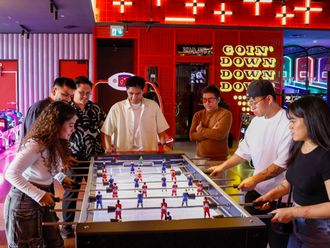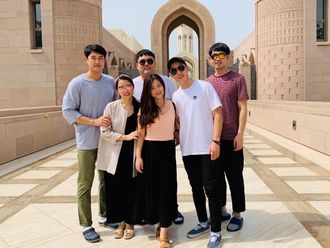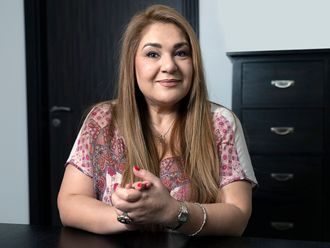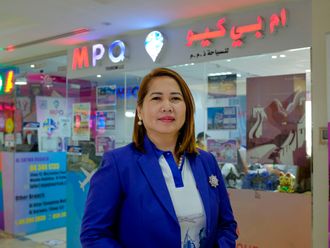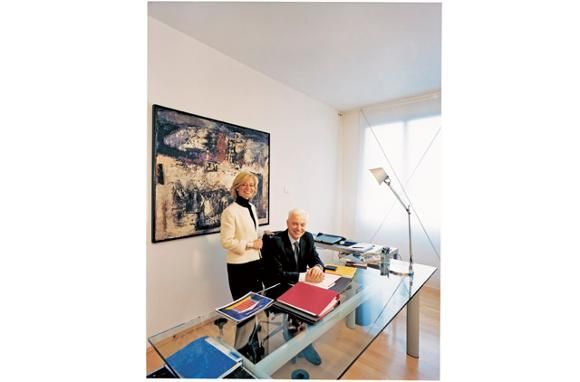
Paolo Bertazzoni is on the terrace of the Al Bustan Rotana hotel, soaking up the sun with his daughter Valentina, 31, and son, Nicola, 35. It looks like a relaxing family vacation, but the 57-year-old chief executive of Bertazzoni, a maker of high-end kitchen appliances in the northern Italian town of Guastalla, is in the UAE to push sales in the Middle East. Valentina and Nicola are not on a holiday either – she’s the brand manager and he’s head of sales.
The financial downturn in the West and the Euro crisis might have battered his key markets, but Paolo’s outlook remains bullish and he expects sales to rise this year. What is remarkable is that the 131-year-old company, whose products are available at Jashanmal, has managed to keep growing, mostly by venturing into new markets, especially the US.
Bertazzoni has redesigned some products to suit American tastes, including super-sized ovens to cater to the market’s needs. Paolo tells Friday what it means to work in a family business and the dreams he has for himself and the company:
After studying business administration I joined Procter and Gamble to gain some experience. And then a few years later in 1981, at the age of 25 I joined the family business. I always knew I’d go into our family business, but it was important to know how regular businesses functioned before making this move. Bertazzoni was established in 1882 in Guastalla. Initially it started out manufacturing scales for the cheese industry.
Food is an integral part of Italy’s culture and Guastalla is famous for its cuisine. So maybe it was natural to start manufacturing products for the kitchen. Being Italian, design is extremely important not only from the functional point of view, but also emotionally and visually. A product, whatever it may be, has to embody emotion, otherwise customers won’t connect with it.
When you are part of a family business, it’s hard not to become a part of it even if you are not directly involved in it. So you begin to imbibe the mechanics of the business without ever being inducted into it formally, or being groomed for it consciously. It’s not an obligation. It’s kind of like a sixth sense. My father was a very big influence on me while growing up. He was a very frugal, serious person, open-minded and very aware of what was happening around him.
I remember visiting the factory with him when I was young, when he taught me to greet everybody I met no matter who they were. That’s how I learnt to respect all people, no matter what their position. I travelled with my father on his business trips whenever I had my school holidays, and it turned out to be more than a holiday. Travel itself is an education – it expands your mind and increases your knowledge base. It gives you an open mind – as important in life as it is in business. This has had a very big influence on the way I do business.
My father encouraged me to work out my own way of dealing with issues and running the business. When I was 18, he sent me to the UK, to learn English, which he felt was vital to expanding our business. It was a challenge for me, and initially intimidated me. But it changed my life. I went to business school later, because theory is important to give you the right framework for experience. In my view experience alone is not sufficient. You must read, you must learn what others have achieved. It can give you an edge.
When you work in a family concern it is important to understand the principles laid down by the previous generations and follow them. The basic principles our family stays committed to have been the same since the company’s inception – to be frugal, to think long-term and to have a clear separation between family and company. We have three main rules for family members to join the business – he or she has to want it, be the right age and, most importantly, must be deserving of the position.
The company is a living organism. It needs to be groomed, it needs to be cared for and, of course, it needs investment in terms not just of finances, but time and effort. It’s a lesson my father taught me. Being a family business does not limit our growth as ours is a global company. I believe that the long-term views that most family companies have make them more resilient during difficult times.
While family businesses might not be very adventurous – they don’t take many risks – and in a booming economy they might make less money, but we do progress steadily. Steady performance is what sets family-owned companies apart and what helps them weather rough times. Tough times are difficult to predict and to steer through. But if you have sound anchors – fundamentals – and the right amount of luck, it is possible to sail through unscathed.
Our company is still growing in these turbulent times as we have a balanced worldwide presence. We focus on three areas – Europe, North America and the Middle East. Not all the markets are bad now. Many are recovering or in good shape. The US market is bouncing back where we are concerned and the Middle East is, of course, growing. Another lesson my late father taught me is that business is not just about making money; business needs to be a machine for progress.
We believe that as entrepreneurs we have a social responsibility to give back to society and we try to do this in as many ways as possible. Right now we are sponsoring the refurbishing of the local cathedral in northern Italy. Heritage is very important to our company. Two of my children have joined the company. Nicola is an engineer and he worked for seven years in the automotive industry in the purchasing departments of companies like GM, Fiat and Toyota.
Valentina is a certified architect. They joined the family business as they saw its potential. When appointing people what I look for is dependability, energy and that they have good values as a human being. I am not very hard on my staff. I believe a leader is as strong as his followers – they are the ones that add to his stature, so he has to empower them, carry them with him.
I had an uneventful childhood. I feel I was very lucky, because eventful childhoods are usually ones full of turmoil! I grew up in Guastalla and my family has always been very close and united. This has percolated down the generations, and my wife Gabriele and my three children follow the same tenets – we all live near each other and we all have Sunday lunch together. This is an absolute must. The entire family unites under one roof. It’s wonderful when we share our joys together.
Time for me is a friend. Although I am sometimes overwhelmed by my schedule, I try to carve a little time for myself. I love to read, mostly to educate myself about what’s happening in the world. I travel a lot, and I like to stay informed about the places I visit, not only for business purposes but also to understand the local culture.
I love sailing, yachting and the sea, but I don’t get much time to indulge my passion. I love to walk around – driving around places is not my style. This way you get to know the place, its people very intimately. I like to understand the true rhythms of the area, the people, and the only way you can feel the pulse of a culture is to walk and assimilate the sights, smells and sounds of a city. You can stop when something catches your interest, try to understand and absorb it.
Food is very important in Italian culture and it plays a big role in my life. I cook, and not just because we manufacture cooking appliances – it’s very relaxing for me, because you can express yourself through cooking. It’s also a challenge because you can’t take the result for granted! It allows you to be creative, and you make something that’s worth sharing with others. I love cooking pasta – which is a must for an Italian. There are thousands of ways of cooking the many different types of pasta. It really perks me up.
Dreams are the fuel of life. A man without a dream is a man with nothing to look forward to. He will very easily be prone to depression. Dreams are very important for every human being. What I do is put my dreams – or plans – on paper not necessarily in a structured manner. When I go through them later I can see whether there are any that can be realised. My little book of dreams, is what I call it. Many of the dreams, when they are written in black and white, can be realised.
I dream of growing my company, and seeing it endure for many generations to come. What I look for is balance. It’s very important to look around and see what’s going on, analyse it and put it in the right box.




